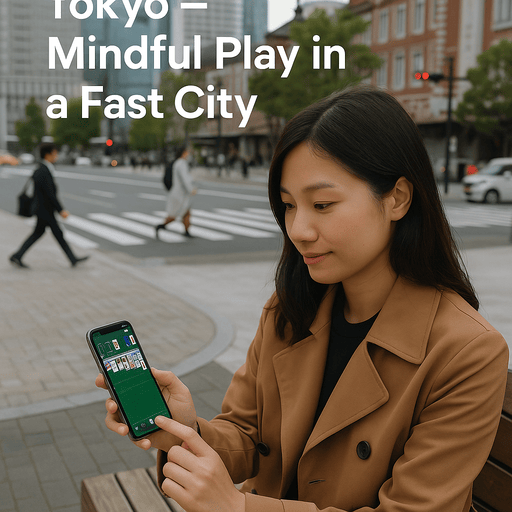
Tokyo — Mindful Play in a Fast City
Tokyo moves quickly—train doors whoosh, crosswalks bloom with people, neon hums into the night. And yet, within that motion, the city offers quiet pockets where attention can settle. A single, finite card layout fits this rhythm perfectly: no timer, no buzz, just a calm puzzle that waits and ends when you decide. When the itinerary gets dense, a compact round of solitaire bliss restores focus without stealing the day.
Why Tokyo suits mindful, finite play
Contrast that clarifies. Big-city energy makes small, contained tasks feel especially satisfying. One board, one goal, one clean finish.
Abundant stillness. Shrines, gardens, and hushed corners give attention a place to land.
Polite pauses. Trains, queues, and mid‑afternoon breaks become gentle interludes rather than lost time.
Control over tempo. A layout can sit open on a laptop or phone and resume at the next quiet moment—no pressure to rush.
Local Highlights (See More, Stress Less)
Top landmarks for a balanced itinerary
Meiji Shrine (Harajuku): towering trees and soft gravel underfoot—a natural reset between busy districts.
Shinjuku Gyoen National Garden: broad lawns, teahouse paths, and seasonal color; step aside for three measured moves and return refreshed.
Sensō‑ji (Asakusa) & Nakamise Street: tradition and texture—visit, then pause off the main path for a tidy, finite puzzle.
Imperial Palace East Gardens: stone, water, and open sky—space for slow breaths and clear decisions.
Rikugien & Kiyosumi Gardens: footbridges and pond views that invite unhurried attention.
Tokyo Skytree area: skyline perspective; let the eyes rest afterward before the next scene.
Odaiba Seaside Park: ocean air and long promenades—perfect for a quiet recalibration.
teamLab exhibits (any location): immersive stimulation; counterbalance with a simple board once you step back into daylight.
Solitaire‑friendly pauses
Tokyo Metropolitan Central Library (Minato): spacious reading areas—ideal for “reveal a card, tidy a run, stop on clarity.”
Daikanyama T‑Site area: gentle café/bookstore flow; easy to pause and resume a hand.
Hamarikyu Gardens teahouse surroundings: calm water views support slow, thoughtful choices.
Yoyogi Park benches: filtered light and wide paths—good for two or three deliberate decisions.
Shinkansen or limited‑express rides: seated stretches where a finite layout fits naturally.
Rain / Heat plan
Rain: museums, libraries, and department‑store cafés turn a wet day into a focused one.
Heat: shade in gardens, indoor atriums, and station lounges—your session can pause for hydration and continue when you’re ready.
A soft day plan (Tokyo edition)
Morning — set intention, not pace. Before heading out, open one layout and choose a single aim: reveal a face‑down early or create one empty space. End as soon as attention feels clearer—win or not.
Midday — reset between sights. After a shrine, museum, or market, make three deliberate moves. Favor reveals and clean consolidations over flashy shuffles. If a line feels forced, back up two steps and choose the simpler path.
Evening — wind down gently. Pick a variant that matches your energy. Keep decisions minimal: make moves that either reveal a card or complete a tidy run. Close the hand when you feel the day settle.
Micro‑drill for “fast city, calm mind” (no timers)
Pre‑scan with breath: One slow inhale; spot two routes that would flip a card within three actions.
Commit to one route: Follow it without rushing; if it stalls, undo to the last clear fork.
Switch with intention: Try the second route; prefer the move that keeps suits clean or opens space.
Name the lesson (five words): “Early space created momentum,” “Mixed suits slowed progress,” etc.
Two passes are enough to compress rules into instinct—even on a full travel day.
Brain and body benefits on the road
Attention without overload. A finite puzzle engages working memory and planning, then ends neatly—perfect before dinner, bedtime routines, or early trains.
Eye comfort. Static cards and predictable motion are easier on eyes than fast‑cut video; blink naturally and look away often.
Flexible pacing. Unlike infinite feeds, a hand of solitaire pauses cleanly and respects the schedule you actually have.
What to play in Tokyo (match your mood)
Klondike: Balanced and forgiving—great for café mornings and train windows.
Spider: Deeper planning for quiet garden afternoons.
TriPeaks: A light, chain‑like rhythm that lifts energy without pressure.
Prefer to keep everything digital while you’re out and about? A few quiet hands of solitaire online offer the same unhurried structure—no social feed, just a layout that ends when you decide.
A small traveler’s ritual
Set one cue: “Reveal early,” “protect suit integrity,” or “tidy one run.”
Make three clear decisions. If a move feels like noise, skip it.
Stop on clarity. Close the hand the moment attention feels restored and step back into the city.
Parting note
Tokyo rewards presence: temple bells, garden shadows, a train arriving exactly on time. Let the city move fast while you practice moving deliberately. A compact, finite puzzle gives the mind a quiet anchor—and that calm carries beautifully into whatever comes next.
